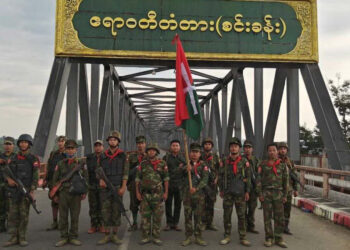RANGOON — Police in Arakan State said that a group of outsiders have rescinded an attempt to protest against an upcoming campaign stop by opposition leader Aung San Suu Kyi.
Two men, unknown to locals, applied for a permit allowing 300 people to demonstrate against the visit in Thandwe, a police officer in the central Arakan township told The Irrawaddy. Following pressure from local township heads and religious leaders, the men have withdrawn their application.
Min Kyi, a candidate for the Lower House for Suu Kyi’s party, the National League for Democracy (NLD), said the local chapter of the Association for the Protection of Race and Religion strongly opposed the planned demonstration.
The Buddhist nationalist group, known by its Burmese acronym Ma Ba Tha, has at times clashed with the party in the lead-up to a Nov. 8 general election, accused of using religion to interfere with politics and casting the opposition as pro-Muslim.
Pamphlets and speeches disseminated by members of the group have made defamatory references to the NLD in several parts of the country, though Ma Ba Tha’s leadership has denied responsibility for the incidents and materials in question.
“Town heads and Ma Ba Tha monks stood up together to maintain the dignity of Thandwe’s image,” Min Kyi told The Irrawaddy on Wednesday. The two protest organizers were found to have been outsiders that came from Sittwe and Jade Taw, near Ngapali beach.
The NLD had previously announced that party chairwoman Suu Kyi would visit the troubled state for three to four days beginning on Oct. 16. She is expected to attend rallies in three townships—Thandwe, Toungup and Gwa.
The party did not announce plans for Suu Kyi to visit the northern part of the state, which was the most severely affected by a serious of ethno-religious riots between Buddhists and Muslims that began in 2012.
Toungup, however, was the site of a retaliatory killing of 10 Muslim commuters following the rape and murder of a Buddhist Arakanese woman in nearby Ramree Township.
The incident served as one of the triggers that set of a devastating outbreak of violence that has crippled the state and left more than 100,000 people displaced, many of them stateless Rohingya Muslims.

















